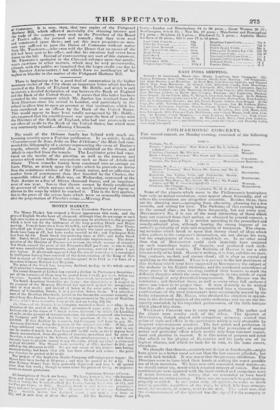PHILHARMONIC CONCERTS.
THE second concert, on Monday evening, consisted of the following selection.
PART I.
Si iambi , No. 8 IHEY.THoYrIr. Quel sepolcru," MiSs Bitten and Mt. E. Sretrus
(Aysese) PAER.
Concerto, Clariunet, Mn. NV I LAI AN MOZART.
Itreit, 11111410. SVe114111i," Mrs. SaAw and Mr. SAPIO (9/1 CisrARoiss. Overture, The Islcs qt. Finial MiovnEtissonn BAuTtlotny. rART Sinfonia, No, 8 HAYDN. Tre111111V," SI is'. thu iuiu, M r. Savuo, and Mr. E.
BEETRooltr.
g MUM Iwo V and Violeueella, Me,gre Lomat, WATTS. TOLUVAVVE, and LIN D1.FY BvwroVIN•
10, Miss HMI, SHAW, Mr. SAPV), Mr. PARRY
WI NTE
junior, and Mr. I:. :"EGUIN Opfer!: at) Overture. The rimpyre MARSCIIVITY. Leader, Mr. Mout—Couiluetur. Mn. II. It. IligifoY.
e ('.thr7i.i) ..
Some of the planets which move in the Philharmonic hemisphere have only an annual revolution, some appear about biennially, and of others the revolutions are altogether eccentric. Besides these, there are the shooting sturs—springing from obseurity, gleaming for a few seconds, and setting for ever. The Sinfonias of this evening belong to the second class ; we hear tbetn frequently, but not every year. Berrnoves's No. 8 is one of the most interesting of those which have not received from their author, or obtained by general consent, a distinctive appellation. It is written according to the prescribed and usually-adopted plan although bearing the strong impress of its author's peculiarity of style and originality of treatment. The charm- ing melodies which break in upon that stormy cloud of ideas which often gathers in the composer's imagination, are not always his own, but his employment of them is completely so. In no other mind than that of BEETHOVEN could such tnaterials have conjured up such marvellous Mina of thought, and produced such strik- ing and unexpected results. The Sinfonia of HAYDN is not a whit less masterly of its kind. HAYDN'S writing, it is true, exhibits no start- ling contrasts, no dark and stormy cloud ; all is clear as crystal and sparkling as the diamond. There is a passage in the last movement of this Sinfonia ns hick must have suggested to Berruoves the subject of the andante in his Eighth Sinfonia; and the accidental coincidence of these pieces in the saute eve lung, enabled their bearers to mark the different thoughts which the same idea suggests in two minds of equal Poe' though of very diversified temperament. Mr. BISIIOP was the conductor ; and therefore these, as well us every other full orchestral
piece was taken in its proper time. It were devoutly to be wished that ;his office could sometimes be converted into a sinecure. The combinations of the wind instruments were occasionally marred by the faulty intonation of Mr. IlinAs, who obtained his situation in opposi- tion to the declared opinion of the entire orchestra ; and we are too fre- quently reminded, by his imperfect performance, of the little intrigue which placed hint there. WILLMAN'S Concerto was in every way perfect. The author and the player were worthy each of the other. The Quartet of BerrooveN, though played with scrupulous aceuraey, wanted that union of style mid effect in the performers which is only attainable by frequent consentaneous practice. The last polish and perfection in singing or playing in parts, are produced by that perception of mutual power and particular effect which results only from constant experi- ment and practice in concert. It is this union of purpose and mind that affords to the playing of BLAGeove nod his party one of its highest charms, and which we look for in vain, to the same extent, else where.
We thought that chance—certainly not design or forethought_might have given us a better vocal bet-out than the last concert afforded; but Ito such luck betided. It was worse than the previous exhibition. The Directors seem to have tried their hands at making the worst possible use of their materials. We have itow only concerted vocal music—or, we should rather say, music which requires concert of voices. But the combinations were ussorted with the most studied mut scrupulous want of ',Dion between all the voices, that we remember to have heard throughout all entire eveniug. There was no approach to part-singing, properly mu called. In one point only, all agreed —to melte as much noise us possible, regardless of the rest ; by which felietoits arrange- uncut, the weakest, of course, went to the wall. The it salt was, that dtltnismerstrmencement tff the Quihtet was the sival kr the company te


























 Previous page
Previous page